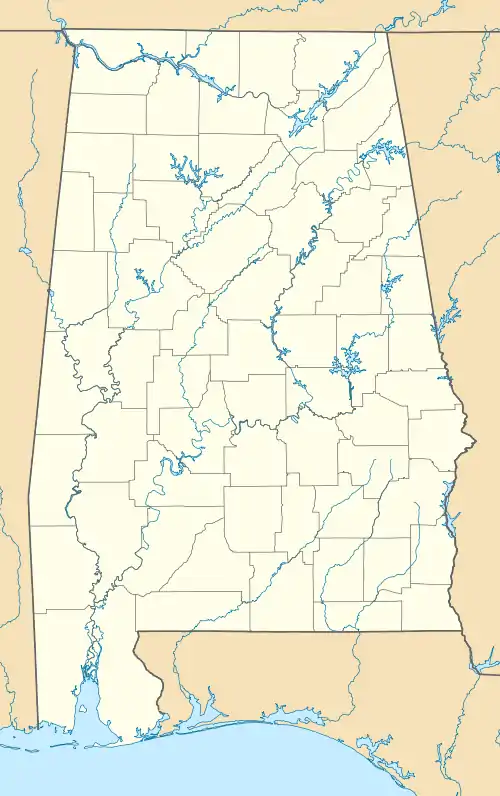Seven Mile Island Archeological District | |
  | |
| Nearest city | Sheffield, Alabama |
|---|---|
| Coordinates | 34°45′2″N 87°44′12″W / 34.75056°N 87.73667°W |
| Area | 800 acres (320 ha) |
| NRHP reference No. | 79003352[1] |
| Added to NRHP | April 16, 1979 |
The Seven Mile Island Archeological District is an archeological site on an island in the Tennessee River in Colbert and Lauderdale County, Alabama. The island is believed to have been inhabited for about 9,000 years, with the earliest artifacts dated to the early Archaic Period. Out of 18 sites identified on the island, two have had extensive study. The Perry Site (1Lu25) is a seven-foot (2.1-meter) thick midden containing ceramic potsherds from the Archaic period. The Seven Mile Island site (1Lu21) is a Mississippian village site and mound.[2] A number of arrowheads and flint knives,[3] as well as a bottle with an engraved bird have been found at the site.[4] 41 burials from the Mississippian era were also unearthed.[5]
The district was listed on the National Register of Historic Places in 1979.[1]
References
- 1 2 "National Register Information System". National Register of Historic Places. National Park Service. July 9, 2010. Retrieved January 21, 2015.
- ↑ Hubbert, Charles M. (August 1, 1978), "Seven Mile Island Archeological District", National Register of Historic Places Inventory-Nomination Form, National Park Service
- ↑ Nolan, Edward J., ed. (1918). Journal of the Academy of Natural Sciences of Philadelphia. Philadelphia: Academy of Natural Sciences. p. 251. Retrieved January 21, 2015.
- ↑ Phillips, Philip; James A. Ford; James B. Griffin (2003). Williams, Stephen (ed.). Archaeological Survey in the Lower Mississippi Alluvial Valley, 1940-1947. Tuscaloosa: University of Alabama Press. pp. 178–179. ISBN 0817350225. Retrieved January 21, 2015.
- ↑ Walthall, John A. (1990). Prehistoric Indians of the Southeast: Archaeology of Alabama and the Middle South. Tuscaloosa: University of Alabama Press. p. 232. ISBN 9780817305529. Retrieved January 21, 2015.

